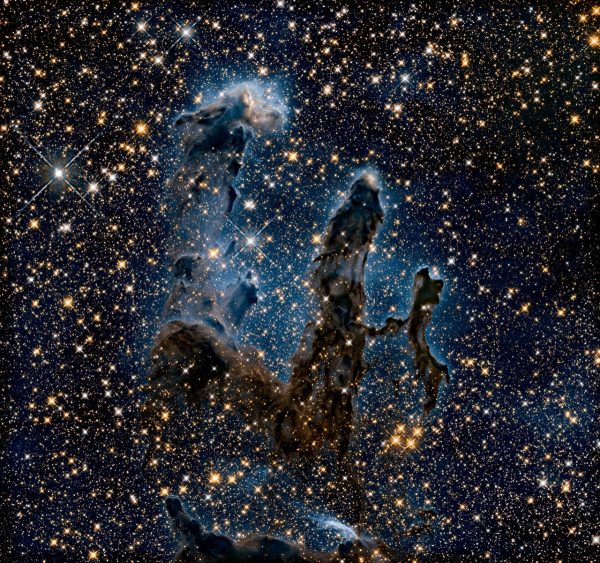"Bad times have a scientific value. These are occasions a good learner would not miss." -Ralph Waldo Emerson
The enterprise of science is one of the most misunderstood in all of society. Some view it as its own religion; others view it as a political ideology gussied up in smart-sounding clothes; still others view it as open to interpretation. But science is none of those things, and is rather the full suite of knowledge humanity has accumulated along with our process of discovery, investigation, and ongoing hard work.
 Astronaut candidates Tyler N. (Nick) Hague, Andrew R. Morgan and Nicole A. Mann, as they look over a chart that will help sustain them for three days in the wilderness. Image credit: NASA / Lauren Harnett.
Astronaut candidates Tyler N. (Nick) Hague, Andrew R. Morgan and Nicole A. Mann, as they look over a chart that will help sustain them for three days in the wilderness. Image credit: NASA / Lauren Harnett.
When we look at why humanity is so successful as a species, it's rooted in our ability to understand the natural world. We've learned how a variety of systems work, independently and together, and have figured out how various influence affect it. This has led to advances in everything from agriculture, health, safety, and medicine to Earth science, astronomy, and particle physics.
 The stars within and beyond the Pillars of Creation are revealed in the infrared. While Hubble extends its view out to 1.6 microns, more than twice the limit of visible light, James Webb will go out to 30 microns: nearly 20 times as far again. Image credit: NASA, ESA/Hubble and the Hubble Heritage Team.
The stars within and beyond the Pillars of Creation are revealed in the infrared. While Hubble extends its view out to 1.6 microns, more than twice the limit of visible light, James Webb will go out to 30 microns: nearly 20 times as far again. Image credit: NASA, ESA/Hubble and the Hubble Heritage Team.

"And perhaps most challenging of all: we need to always be open to the possibility that our best laws, conclusions, theories, and models may be wrong."
And if there is no way to show that they are wrong, that is, if they are unfalsifiable? Sabine Hossenfelder states exactly that here:
Sabine Hossenfelder: "Many of my colleagues believe this forest of theories will eventually be chopped down by data. But in the foundations of physics it has become extremely rare for any model to be ruled out. The accepted practice is instead to adjust the model so that it continues to agree with the lack of empirical support."
Sabine Hossenfelder: "The criticism you raise that there are lots of speculative models that have no known relevance for the description of nature has very little to do with string theory but is a general disease of the research area. Lots of theorists produce lots of models that have no chance of ever being tested or ruled out because that's how they earn a living. The smaller the probability of the model being ruled out in their lifetime, the better. It's basic economics. Survival of the 'fittest' resulting in the natural selection of invincible models that can forever be amended."
Start a discussion about the scientific method, Ethan. The experimental testing is meaningless if some preliminary requirements are not fulfilled.
@Pentcho Valev #1,
Actually, what humanity needs to survive is more self control rather than more technical means of centralized control over everything and everyone else. Science is great for discovering new ways to create even bigger problems by handing people who really can't handle what they already have even more leverage to screw with things.
"Science never solves a problem without creating 10 more."
- George Bernard Shaw
.
I do think Sabine Hossenfelder is an excellent example of what a good scientist or physicist is supposed to be like. Her brutal honesty is incredibly refreshing in comparison to Ethan's consensus 'happy talk' PR. She is critical of sloppy reasoning even if made by an established 'authority' as well as a skeptic of the groupthink monoculture mentality in academia posing as rigorous science. She also isn't interested in the ridiculous poetic license frequently being misused in physics for things looking 'beautiful', 'elegant' or 'natural' when the actual theory that underlies it is tenuous speculation.
@CFT
I partially agree about Sabine Hossenfelder, but unfortunately she will also have to answer "the embarrassing question":
Peter Hayes, The Ideology of Relativity: The Case of the Clock Paradox: "This paper investigates an alternative possibility: that the critics were right and that the success of Einstein's theory in overcoming them was due to its strengths as an ideology rather than as a science. The clock paradox illustrates how relativity theory does indeed contain inconsistencies that make it scientifically problematic. These same inconsistencies, however, make the theory ideologically powerful. [...] The gatekeepers of professional physics in the universities and research institutes are disinclined to support or employ anyone who raises problems over the elementary inconsistencies of relativity. A winnowing out process has made it very difficult for critics of Einstein to achieve or maintain professional status. Relativists are then able to use the argument of authority to discredit these critics. Were relativists to admit that Einstein may have made a series of elementary logical errors, they would be faced with the embarrassing question of why this had not been noticed earlier. Under these circumstances the marginalisation of antirelativists, unjustified on scientific grounds, is eminently justifiable on grounds of realpolitik. Supporters of relativity theory have protected both the theory and their own reputations by shutting their opponents out of professional discourse. [...] The triumph of relativity theory represents the triumph of ideology not only in the profession of physics bur also in the philosophy of science."
@Pentcho Valev,
Often a scientist can be partially correct about something, or just more correct than what was previously thought as the official belief about something. I think Einstein was correct about some things, but not everything (and he said as much), and the man did make documented mistakes, he had more than a few official retractions in his own professional lifetime which took some humility that many today do not have.
.
If you want to have fun with poking at relativity and Big Bang folklore until someone becomes flustered, ask someone (like Ethan) if he believes in the Big Bang OR Black Holes, because the underlying theory and math of both theories is actually mutually exclusive for the most part, which he should also be aware of and is (as usual) just glossing over. You can't have it both ways mathematically.
.
All Black hole universes:
1.are spatially infinite
2.are eternal or static
3.can contain only one mass
4.are not expanding
5.are asymptotically flat or asymptotically curved
.
All Big Bang Universes:
1.are spatially finite (1 case) or spatially infinite (2 cases)
2.are finite in age, non static, non stationairy
3.contain radiation and many masses
4.are expanding
5.are not asymptotically anything
.
CFT wrote: "I think Einstein was correct about some things..."
He wasn't. His constant-speed-of-light postulate was false, and that was fatal not only for his theory but for theoretical physics as a whole. The following quotations are suggestive:
Joao Magueijo, New varying speed of light theories: "In sharp contrast, the constancy of the speed of light has remain sacred, and the term "heresy" is occasionally used in relation to "varying speed of light theories". The reason is clear: the constancy of c, unlike the constancy of G or e, is the pillar of special relativity and thus of modern physics. Varying c theories are expected to cause much more structural damage to physics formalism than other varying constant theories."
Quote: "But the researchers said they spent a lot of time working on a theory that wouldn't destabilise our understanding of physics. "The whole of physics is predicated on the constancy of the speed of light," Joao Magueijo told Motherboard. "So we had to find ways to change the speed of light without wrecking the whole thing too much."
“The enterprise of science is one of the most misunderstood in all of society. Some view it as its own religion; others view it as a political ideology gussied up in smart-sounding clothes; still others view it as open to interpretation. But science is none of those things, and is rather the full suite of knowledge humanity has accumulated along with our process of discovery, investigation, and ongoing hard work.”
Science is also not “… the full suite of knowledge humanity has accumulated …”
There is, IMHO, considerably more to the full suite of knowledge humanity has accumulated than Science.
Others are, of course, entitled to differ.
You have to wonder whether CFT and PV come naturally to denial of any scientific result made after 1600 or whether they choose to be modern denial mongers.
@ John #6,
Yeah, I caught Ethan's blatant conflation of 'the full suite of knowledge humanity has accumulated..' with his pristine idealization of 'science'. He's not very subtle.
.
What Ethan really doesn't seem to want to consider is that as scientists seek to become effectively technocrats by pursuing increasing amounts of government money, power, influence, and continue to align themselves with other leftist rent-seekers, they will eventually become just another extension of a particular political group with "a political ideology gussied up in smart-sounding clothes", and then be cut off from the government money spigot.
@Ethan wrote:
Welcome to postmodern concept creep brought to you by higher education where words are violence and the sexes are a social construct on a spectrum. Science is all of those things depending upon who is talking. You'll find the worst offenders teaching in the Social Science Department.
Personally I'm with you. So is a lot of America. Academia would be far better off if anyone subscribing to postmodernist ideas other than at an Architectural School was sent packing. I'm sure they'd make great baristas.
Science doesn't care about your feelings. Science isn't made less valid by citing too many white males. Your gender doesn't matter. Your oppression rating doesn't matter. It is not about you. Get over yourself. Be smart. Work hard. Be open and honest about your ideas. Present them clearly so they can be duplicated and don't get all butt hurt when someone shoots a hole in them. They're ideas. They aren't you. Most of all, stop redefining words to dress up your stupid ideas in unearned validity.
As of 7/26/2017 We found & turned off Global Warming for the last time hopefully. The species that implemented their Organism was NOT from our Universe, but left earth MAY 2017 for deep space. Also all freshwater lakes on earth each tie in with a ocean & each's level depends on pressure from that ocean. In the year 2000 A great Lake lost 7 feet of water in 2 day's. My solution for the massive load of freshwater on top of saltwater in Iced territory's can be extracted by each Nation. Dig channels & lakes throughout each nation & put this freshwater in by using cargo ships with heavy duty suction equipment on board with incoming lines over the sides of each ship at least 3 feet underwater. Extract it out head home & unload into channels then back for more. By the time its gone all land taken by 40 years of Global Warming will be back to being dry again. Global Command
Stability is seen here as 'stagnation'.
Stability is what is needed to preserve the relationship with the planet - or we continue to rape and outgrow it. Many indigenous tribes lived in harmony with the environment - taking what could be replenished. They survived thus for a long time. We are accelerating out of control now.